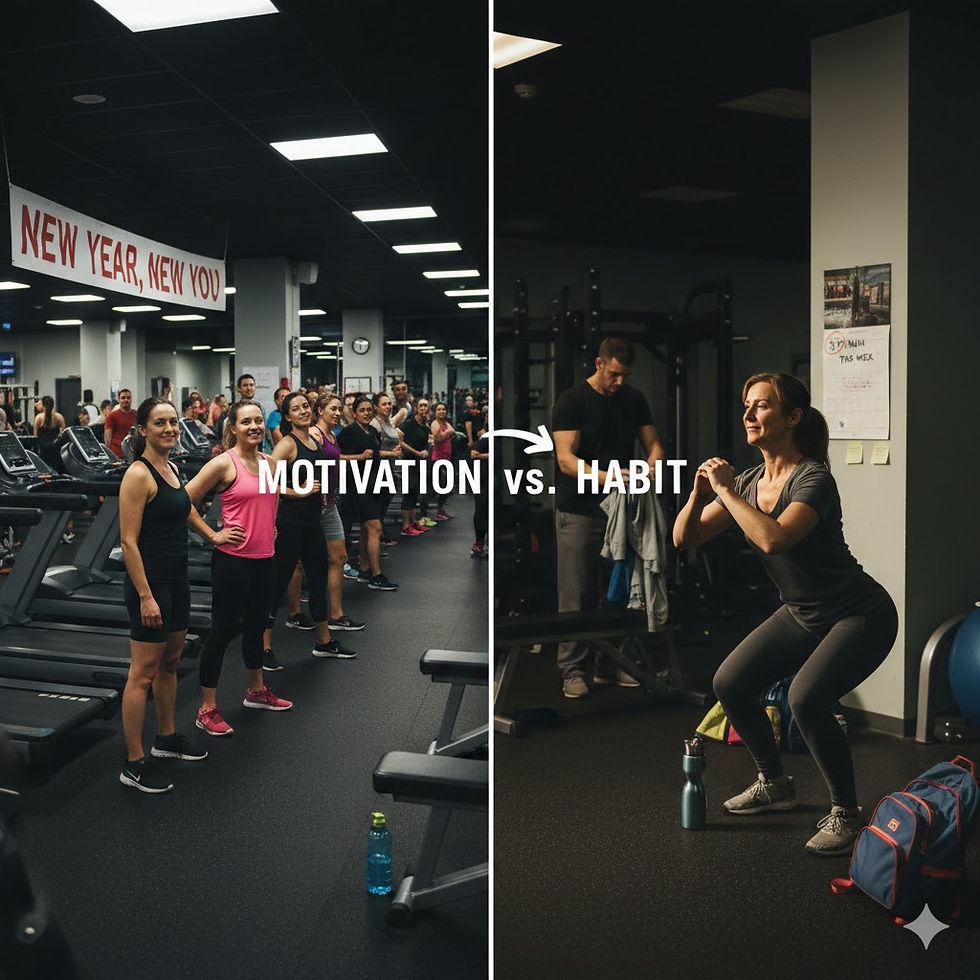🧠 Creatine Benefits: Not Just for Gym-Goers — Revisited
- ross5156
- May 29, 2025
- 4 min read

This is Part 2 of our Creatine Series. In our last post, we explored how creatine can benefit both men and women beyond just muscle gains. Since then, new research has revealed some surprising ways creatine may support brain health, energy, and mood — prompting us to take a second look at this underrated supplement.
🧬 What Exactly Is Creatine?
Creatine is a natural substance your body produces — and you also get some from foods like red meat and fish. It helps your cells manage energy, especially during high-demand situations like exercise or illness.
In the past, creatine was mostly linked to gym performance. But now, research is uncovering its benefits for the brain and nervous system, even in people who never set foot in a gym.
🧠 Think of creatine as a portable energy bank — giving your brain and body quick access to extra fuel when it needs it most.
📰 What the New Science Says
Several recent studies — including one featured in BBC Future — are challenging old assumptions and showing us how creatine may support:
1. Mental Clarity & Cognitive Energy
Creatine helps brain cells access energy quickly. This becomes especially useful when we’re tired, stressed, or recovering from illness.
In one 2024 study published in Nutrients, adults who took creatine showed improved memory and processing speed, particularly when sleep-deprived.
It’s even being studied as a potential aid for people with Alzheimer’s disease and brain fog linked to viral infections.
2. Lifting Mood & Motivation
Research suggests that creatine may support mood regulation, especially in people with depression or anxiety. It helps restore energy balance in brain regions that influence how we feel emotionally.
Some early trials have shown promising results in combining creatine with antidepressant therapies — offering faster improvements in mood.
3. Recovery, Immunity & Overall Energy
Creatine supports all your body’s cells — not just muscles — by helping them store and use energy more efficiently. That may explain its benefits for immune health, post-viral fatigue, and general recovery.
👩⚕️ A Real-World Example
One of our clients — a woman in her late 40s recovering from long COVID — reported ongoing brain fog and low energy. After introducing creatine into her routine (alongside lifestyle coaching), she described clearer thinking, better focus, and improved stamina within a few weeks.
Of course, results vary — but stories like hers show why creatine deserves a fresh look, even outside the gym.
⚖️ Should You Consider Creatine?
Creatine is generally safe and well-tolerated — but it’s not for everyone, and it’s not a miracle fix.
What to keep in mind:
✅ Consult first: Especially if you’re on medications or managing health conditions.
🔄 It’s a support, not a substitute: It works best alongside a healthy diet and lifestyle.
🧬 Everyone reacts differently: Some people feel a difference fast, while others may notice gradual improvements.
👥 Who Might Benefit Most?
You don’t have to be a bodybuilder to benefit. Creatine might be especially helpful for:
🧓 Older adults looking to support memory and muscle maintenance.
🥬 Vegetarians and vegans, who typically get less creatine from food.
🛌 People recovering from fatigue or illness, such as long COVID.
📚 Students and remote workers juggling mental loads and screen fatigue.
📈 Visual Snapshot: Creatine’s Benefits Beyond Muscle
Body Benefits | Brain & Mood Benefits |
Supports muscle power | Enhances mental clarity & focus |
Aids recovery after workouts | May support mood and emotional balance |
Helps prevent age-related loss | Supports memory and mental stamina |
💡 Creatine isn’t just a supplement. It’s emerging as a whole-body wellness tool backed by both real-life experience and clinical research.
🎯 Final Takeaway
Creatine is no longer just a sports supplement — it’s becoming a serious player in the health and wellness space. Whether you’re navigating brain fog, mood dips, or simply want more sustainable energy, creatine could be worth a closer look.
We’ll continue to track new developments as more studies emerge. For now, it’s safe to say: creatine has earned its second spotlight.
📣 Take the Next Step
Not sure if creatine is right for you? We’re here to help.
👉 Take our 1-minute quiz – Find out if creatine suits your lifestyle🗓️ Book a free consultation – Get personalized, professional advice📖 Download our free fitness guide – Includes a beginner’s supplement section📱 Follow us on Instagram & Facebook – Stay informed and inspired
About the Authors
Ross and Stephanie O’Loughlin are certified strength coaches and EQF Level 4 personal trainers based in Wexford/Wicklow, Ireland. Through their coaching brand, The FitBoss, they help busy men and women reclaim energy, build strength, and feel confident—without fads or fluff. With years of hands-on coaching experience and a science-based approach, they specialize in sustainable fitness strategies that fit real lives.
📍 In-person & Online Coaching Available
📧 Learn more or book a consult at thefitboss.ie
📚 References
BBC Future (2025). The Surprising Health Benefits of Creatine Powder
Rae, C., Digney, A.L., McEwan, S.R., & Bates, T.C. (2003). Oral creatine monohydrate supplementation improves brain performance. Psychopharmacology
Avgerinos, K.I., Spyrou, N., Bougioukas, K.I., Kapogiannis, D. (2018). Effects of creatine supplementation on cognitive function: A systematic review. Experimental Gerontology



Comments